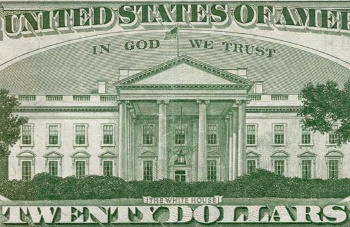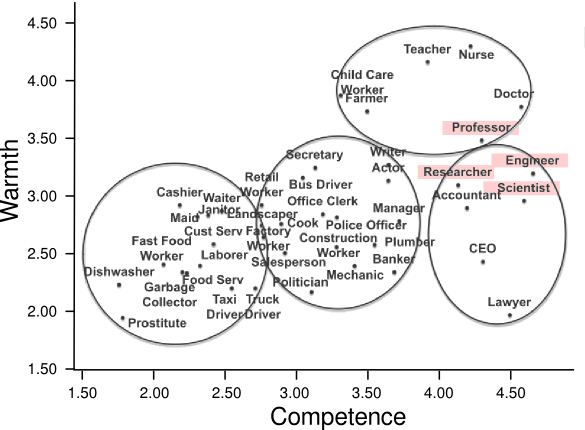Trust in Science
October 13, 2014
Who Do You Trust? was a
television game show that ran from 1957-1963. I'm sure that early in the show's planning, someone pointed out that the title should be,
Whom Do You Trust?, and he was promptly laughed out of the room. Such was the fate of the
Grammar Police even before the
Internet.
Trust is an essential part of
science. Aside from the few reported problems of
data fabrication and
plagiarism that seem to happen on a near weekly basis, scientists are an honest bunch, at least percentage-wise. Perhaps it's my
physical science hubris speaking, but nearly all such dishonesty seems to happen in the
biological and
social sciences, and in
psychology. One egregious
counterexample is the
Schön scandal in
physics, so no field of science is without
sin.
We're living is an era of elevated
distrust. The
public seems to have lost trust in
corporate and
financial institutions, and in their
government leaders. While
U.S. President,
Dwight D. Eisenhower, rightly warned us in 1961 about the danger of the
military-industrial complex, who in the new
millennium warned us about the insidious affect of
lobbyists,
political action committees, and
money on
government policy?

In God We Trust - All Others Pay Cash.
In God We Trust (shown on a twenty dollar bill) is the modern motto of the United States, substituting for e pluribus unum.
(Via Wikimedia Commons.)
While the
American Physical Society has joined many other
scientific societies in issuing a
statement affirming
climate change, there are still many who don't believe that there is
global warming, let alone
anthropogenic climate change. In short, some members of the public don't trust
scientists or the
scientific method.
Google search has an
autocomplete feature. As an exercise suggested by
PHD Comics in which Google's autocomplete gave some interesting results for the
query, "Academics are...," I typed, "
Scientists are..." Here's what I got (note that some Google features are customized to the user, so your results may vary):
Scientists are idiots
Scientists are liars
Scientists are liberal
The Internet, apparently, has a strong
bias against scientists.
While I object to being called an idiot and a liar, I do confess that I'm a liberal. In my experience, most scientists are liberals, so that's not a surprise. It's also my experience that most
engineers are
conservatives. It's probably good to have conservatives design things like
elevators and
airliners, so a conservative engineer is a good thing. Likewise, there shouldn't anything too damning about being a liberal.
Susan Fiske and
Cydney Dupree of
Princeton University's Woodrow Wilson School of Public and International Affairs have just published a study of the public
perception of scientists, and they make recommendations as to how this perception might be improved. According to Fiske and Dupree, the public perception of a person is a combination of a their apparent intent (warmth) and capability (
competence).[1-2]
Their work, which involved just the
American perception of scientists, was published in the
Proceedings of the National Academy of Sciences.[2] According to their study, scientists are considered to be competent, but they lack public trust, since they are not friendly or warm. They advise scientists to act "warmer."[2] Says lead author, Susan Fiske, the Eugene Higgins Professor of Psychology at Princeton, and professor of
public affairs,
"Scientists have earned the respect of Americans but not necessarily their trust... but this gap can be filled by showing concern for humanity and the environment. Rather than persuading, scientists may better serve citizens by discussing, teaching and sharing information to convey trustworthy intentions."[2]
The study involved a first phase in which a list of 42 typical American jobs was compiled by an
online survey (I would have used government
statistics, but the psychology
modus operandi is the survey). The list included scientists,
researchers,
professors and
teachers.[1-2] Another group of adults was polled to rate these
professions for warmth and competence. The results are summarized in the figure.[2]

Warmth-Confidence plot for professions, as found in the described study by Fiske and Dupree. (Princeton University image, redrawn for clarity.)[2)]
As can be seen in the figure, the warmth-competence
phase space spans professions from the lower
quadrant (
prostitutes), to the upper quadrant (
nurses,
doctors, and
teachers). The low warmth and low competence region populated by some professions engenders
contempt or
disgust. The high competence and low warmth region, populated by scientists, engineers, and
lawyers, engenders
envy and distrust.[2]
Some professions, such as
bus drivers and
police, are relatively neutral in this warmth-competence space. The
unemployed, perceived to have high warmth but low competence, are in a "
pity" group.[2]
Interestingly,
climate scientists were found to be less suspect than scientists doing
basic research.[1-2] This might be a consequence of climate scientists' attempts to educate the public. Those involved in basic research don't explain their research that often, since that's probably more difficult to do.[2] I guess that
Sheldon Cooper might be the
archetypal practitioner of basic science, as far as the public perceives it.
So, the path to public trust of science is through discussion, teaching, and the sharing of information.[1] Perhaps by writing a science
blog?
References:
- Susan T. Fiske and Cydney Dupree, "Gaining trust as well as respect in communicating to motivated audiences about science topics," Proc. Natl. Acad. Sci., vol. 111, supplement 4 (September 16, 2014), pp. 13593-13597.
- B. Rose Huber, "Scientists Seen as Competent But Not Trusted by Americans," Princeton University Press Release, September 22, 2014
Permanent Link to this article
Linked Keywords: Who Do You Trust; television; game show; Grammar Police; Internet; Trust; science; data fabrication; plagiarism; physical science; hubris; biology; biological; social science; psychology; counterexample; Schön scandal; physics; sin; distrust; public; corporation; corporate; finance; financial; government; President of the United States; U.S. President; Dwight D. Eisenhower; military-industrial complex; millennium; lobbying; lobbyist; political action committee; money; public policy; government policy; In God We Trust; United States twenty-dollar bill; United States national motto; e pluribus unum; American Physical Society; scientific society; statement; climate change; global warming controversy; climate change denial; anthropogenic climate change; scientist; scientific method; Google search; autocomplete feature; PHD Comics; question; query; idiot; lie; liar; liberalism; liberal; bias; engineer; conservatism; conservative; elevator; jet airliner; Susan Fiske; Cydney DupreevPrinceton University; Woodrow Wilson School of Public and International Affairs; perception; competence; American; Proceedings of the National Academy of Sciences of the United States of America; public affairs; humanity; environment; citizenship; citizen; Internet; online; opinion poll; survey; statistics; modus operandi; research; professor; teacher; profession; phase space; quadrant; prostitution; prostitute; nursing; nurse; physician; doctor; teacher; contempt; disgust; lawyer; envy; bus driver; police; unemployment; unemployed; pity; climatology; climate scientist; fundamental science; basic research; Sheldon Cooper; archetype; archetypal; blog.